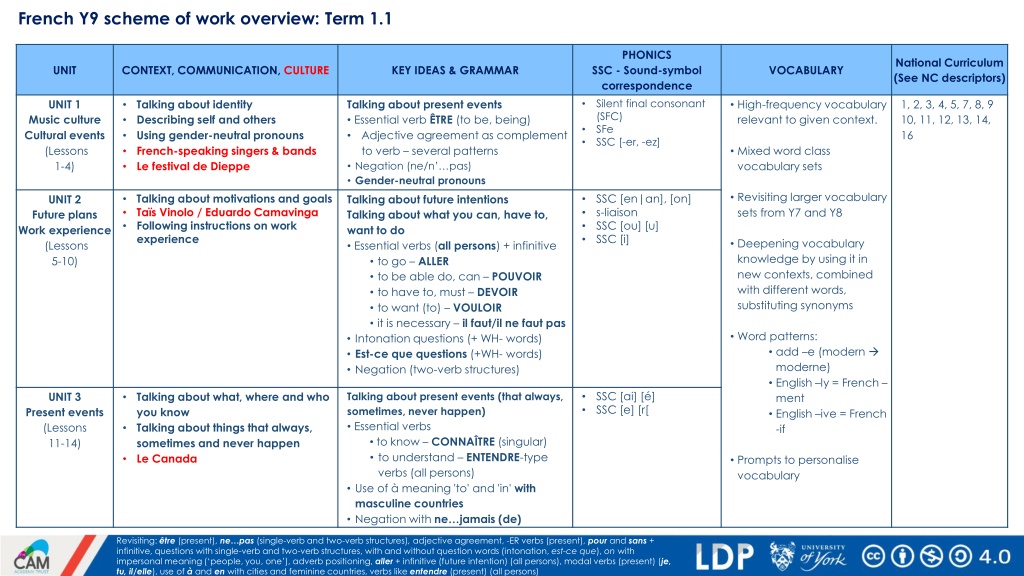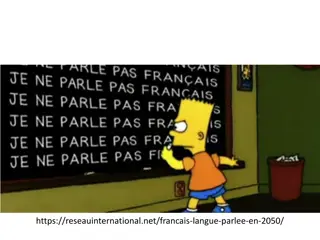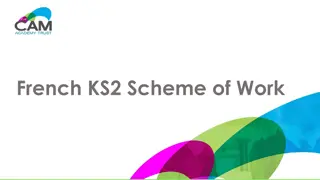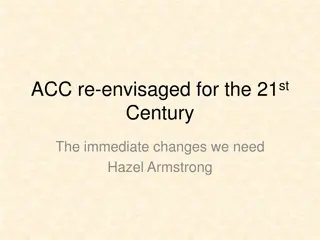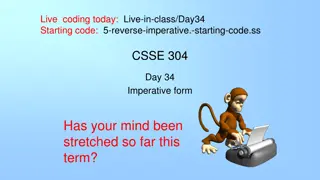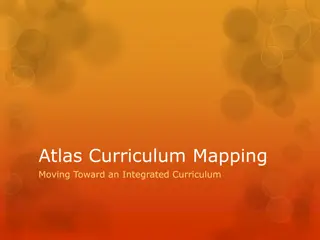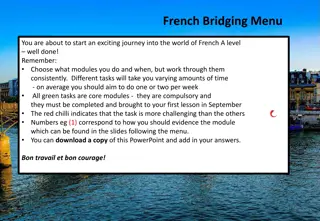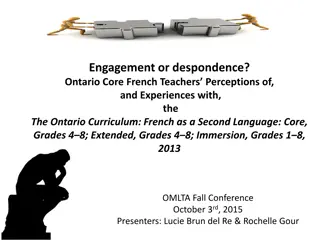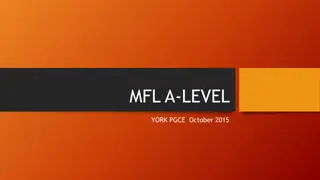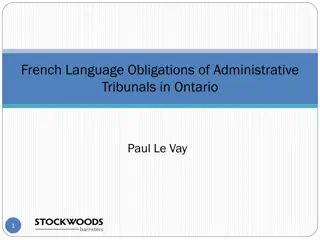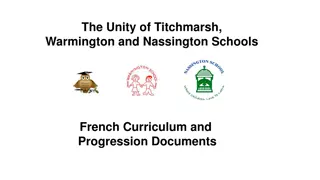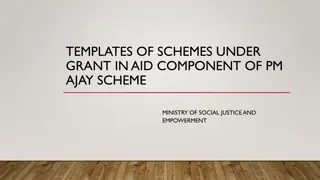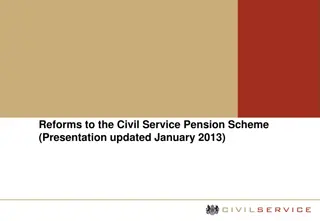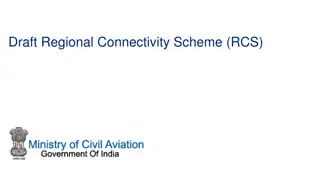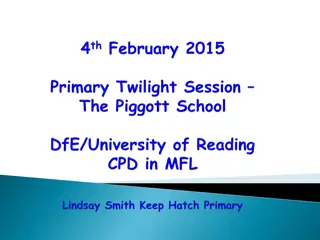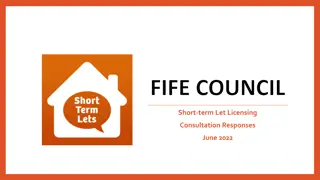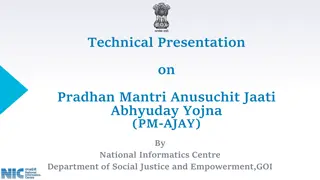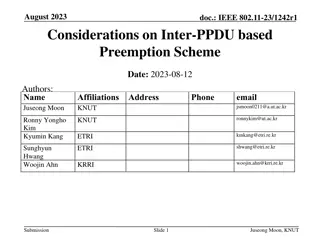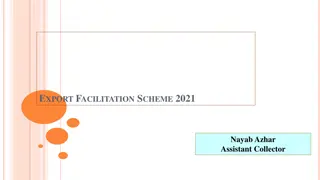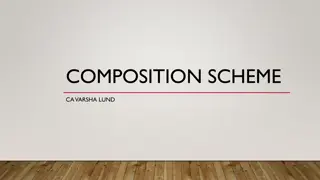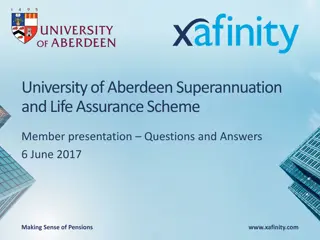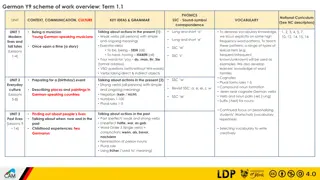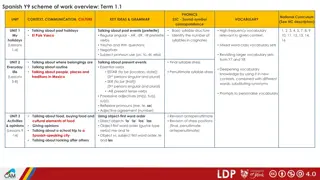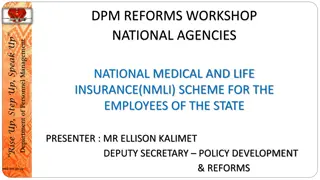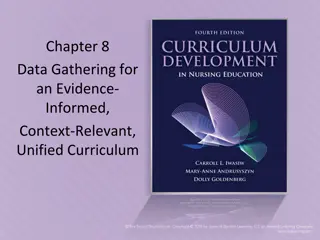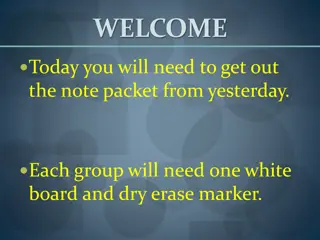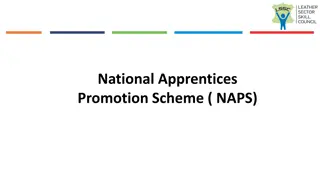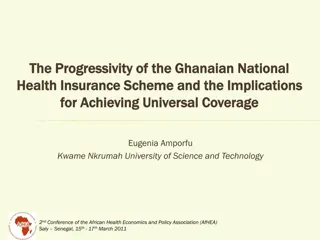French Y9 Scheme of Work Overview Term 1.1 Phonic National Curriculum
This scheme of work covers phonics, communication, culture, and grammar for Year 9 students learning French. It includes topics like talking about identity, future plans, people and places, and talking about your day. Students will learn about essential verbs, adjective agreement, negation, and high-frequency vocabulary in various contexts.
Download Presentation

Please find below an Image/Link to download the presentation.
The content on the website is provided AS IS for your information and personal use only. It may not be sold, licensed, or shared on other websites without obtaining consent from the author. Download presentation by click this link. If you encounter any issues during the download, it is possible that the publisher has removed the file from their server.
E N D
Presentation Transcript
French Y9 scheme of work overview: Term 1.1 PHONICS National Curriculum (See NC descriptors) SSC - Sound-symbol correspondence Silent final consonant (SFC) SFe SSC [-er, -ez] UNIT CONTEXT, COMMUNICATION, CULTURE KEY IDEAS & GRAMMAR VOCABULARY UNIT 1 Talking about identity Describing self and others Using gender-neutral pronouns French-speaking singers & bands Le festival de Dieppe Talking about present events Essential verb TRE (to be, being) Adjective agreement as complement to verb several patterns Negation (ne/n pas) Gender-neutral pronouns Talking about future intentions Talking about what you can, have to, want to do Essential verbs (all persons) + infinitive to go ALLER to be able do, can POUVOIR to have to, must DEVOIR to want (to) VOULOIR it is necessary il faut/il ne faut pas Intonation questions (+ WH- words) Est-ce que questions (+WH- words) Negation (two-verb structures) High-frequency vocabulary relevant to given context. 1, 2, 3, 4, 5, 7, 8, 9 10, 11, 12, 13, 14, 16 Music culture Cultural events (Lessons 1-4) Mixed word class vocabulary sets Revisiting larger vocabulary sets from Y7 and Y8 Talking about motivations and goals Ta s Vinolo / Eduardo Camavinga Following instructions on work experience SSC [en|an], [on] s-liaison SSC [ou] [u] SSC [i] UNIT 2 Future plans Work experience (Lessons 5-10) Deepening vocabulary knowledge by using it in new contexts, combined with different words, substituting synonyms Word patterns: add e (modern moderne) English ly = French ment English ive = French -if SSC [ai] [ ] SSC [e] [r[ UNIT 3 Talking about what, where and who you know Talking about things that always, sometimes and never happen Le Canada Talking about present events (that always, sometimes, never happen) Essential verbs to know CONNA TRE (singular) to understand ENTENDRE-type verbs (all persons) Use of meaning 'to' and 'in' with masculine countries Negation with ne jamais (de) Present events (Lessons 11-14) Prompts to personalise vocabulary Revisiting: tre(present), ne pas (single-verb and two-verb structures), adjective agreement, -ER verbs (present), pourand sans + infinitive, questions with single-verb and two-verb structures, with and without question words (intonation, est-ce que), on with impersonal meaning ( people, you, one ), adverb positioning, aller + infinitive (future intention) (all persons), modal verbs (present) (je, tu, il/elle), use of and en with cities and feminine countries, verbs like entendre (present) (all persons)
French Y9 scheme of work overview: Term 1.2 PHONICS CONTEXT, COMMUNICATION, CULTURE National Curriculum (See NC descriptors) SSC - Sound-symbol correspondence UNIT KEY IDEAS & GRAMMAR VOCABULARY [qu] revisited Building the verb lexicon UNIT 4 People and places (Lessons 15 22) Talking about travel in France Talking about nationality and religion Talking about staying in a hotel Talking about Le S n gal Using infinitives, nouns and adjectives infinitive used as a noun 1, 2, 3, 4, 5, 6, 7, 8, 9 10, 11, 12, 13, 14, 16 [-ien] [ | ] revisited Regular revisiting of Y7 and Y8 vocabulary for consolidation feminine noun formation (-en -enne) open [eu| ] before r plural noun formation (no change with -s, -x) Consolidation of question words and question formation article use with tre + religion -s liaison (revisited) possessive adjectives (votre, vos, leur, leurs) revisit Y7 & Y8 SSCs Number construction 32-69 Text exploitation to extend vocabulary UNIT 5 Talking about your day (Lessons 23 24) Talking about times of different activities Talking about feelings and states Using numbers and telling the time construction rule for numbers 32-69 [en/an] [(a)in] revisited Cognates: English -c, -ck, -k or -ical French -que) impersonal verbs: il est + time uses of avoir and tre (present) to talk Noun and adjective pairs: adjective + article noun (+/- capital letter) about feelings English '-or/-our' French '-eur UNIT 6 Winter celebrations (Lessons 25 26) Extended reading Vive le vent Talking about Christmas meals in Francophone countries Talking about important winter celebrations - Hanoucca Using de (revisited) and using adjectives (revisited) partitive articles for distinguishing between parts and wholes and with uncountable nouns use of de after expressions of quantity, adjective positions (pre- and post-nominal; multiple adjectives), comparative structures (adjectives and adverbs) revisit several SSCs Prompts to personalise vocabulary Revisiting: use of infinitive after aller, aimer, modal verbs, pour and sans, inversion (VS) questions in single- and two-verb structures, croire (je, tu, il/elle), feminine and plural noun formation, article use with tre + nationality, verbs like venir (all persons), possessive adjectives, register: tu vs. vous, partitive for parts and with uncountable nouns, use of de after expressions of quantity, boire (present) (je, tu, il/elle), adjective positions (pre- and post-nominal; multiple adjectives), comparative structures (adjectives and adverbs)
French Y9 scheme of work overview: Term 2.1 PHONICS National Curriculum (See NC descriptors) SSC - Sound-symbol correspondence UNIT CONTEXT, COMMUNICATION, CULTURE KEY IDEAS & GRAMMAR VOCABULARY [-tion] revisited Building the verb lexicon UNIT 7 Talking about La R volution fran aise Celebrating New Year in France and Algeria Talking about accidents and emergencies (La Carte Vitale, le SAMU) Extended reading J ai cherch (Chanson d Eurovision) Talking about free time Talking about crime Talking about past events that (have) happened negation: ne jamais (perfect) 1, 2, 3, 4, 5, 6, 7, 8, 9, 10, 11, 12, 13, 14, 15, 16 Past and present events (Lessons 27 - 38) [e] [ | ] [a] revisited Regular revisiting of Y7 and Y8 vocabulary for consolidation hard and soft [-s] revisited -ER verbs (all persons) taking tre vs avoir (perfect) Mixed word sets -s liaison revisited use of relative pronoun qui in subject relative clauses Cognates: -tion: French word is feminine; cross- linguistic pronunciation difference (revolution la r volution) [y] [i] [oy] revisited use of emphatic pronouns moi and toi after prepositions [au] revisited [oi] revisited Cognates: Words with a circumflex in French and an 's' in English: (la for t forest) NB: the revisited phonics are linked to grammar points in Y9. Extended reading to develop vocabulary English ive = French if Prompts to personalise vocabulary Revisiting: present vs perfect (with past simple and present perfect equivalent in English) (all persons), past participle formation: -ER verbs, verbs like prendre, dit, fait, bu, eu, intonation (SV) and est-ce que questions with and without question words (perfect), adverb positioning (present and perfect), negation (ne pas) (perfect), perfect (with past simple and present perfect equivalent in English) (all persons), 'present vs perfect (with past simple and present perfect equivalent in English) (all persons), use of definite article with body parts, adverb placement (perfect), register: tu vs vous, on vs nous, contraction of definite article after and de, verbs with and de before a noun, verbs like entendre and crire (je, tu, il/elle/on, nous, vous, ils/elles)
French Y9 scheme of work overview: Term 2.2 PHONICS CONTEXT, COMMUNICATION, CULTURE National Curriculum (See NC descriptors) SSC - Sound-symbol correspondence UNIT KEY IDEAS & GRAMMAR VOCABULARY [x-] and [s-] before a vowel Building the verb lexicon UNIT 8 How things used to be (Lessons 39 46) Talking about the school system in France Talking about what and how things used to be -ER verbs in the imperfect tense ( used to meaning) (je, il/elle/on) 1, 2, 3, 4, 5, 6, 7, 8, 9 10, 11, 12, 13, 14, 15, 16 Regular revisiting of Y7 and Y8 vocabulary for consolidation [ou] [u] revisited Talking about childhood memories [ai] [ ] revisited Suffixes: cardinal number + -i me ordinal number (deux deuxi me) verbs like PRENDRE, VENIR, SORTIR, ENTENDRE, LIRE, CHOISIR and CRIRE in the imperfect tense ( used to ) vs present tense (continuous) (je, tu, il/elle/on) Talking about gender identity: Drag montr alaise [-ill|-ille] [-ail|-aill] [-eil|-eill] [-euil|-euill] [-ueil |-ueill], [- il| - ill] [-ouil |-ouill] revisited English '-el' French '-al Regular verbs in the imperfect ( used to ) vs perfect tense (one off events) (je, tu, il/elle/on) Talking about spring holidays Extended reading to deepen vocabulary knowledge Spotlight on two singers Edith Piaf, C line Dion intonation questions (imperfect) Prompts to personalise vocabulary Revisiting: gender-neutral pronouns, ne jamais (perfect); -ER verbs taking tre in the perfect tense; feminine and plural past participle agreement; emphatic pronouns moi and toi after prepositions; relative pronoun qui with subordinate clauses, gender-neutral pronouns
French Y9 scheme of work overview: Term 3.1 PHONICS National Curriculum (See NC descriptors) SSC - Sound-symbol correspondence UNIT CONTEXT, COMMUNICATION, CULTURE KEY IDEAS & GRAMMAR VOCABULARY Silent final consonant (SFC) revisited Building the verb lexicon UNIT 9 Using subject (it/them) and direct object pronouns (me, you, it) 1, 2, 3, 4, 5, 7, 8, 9 10, 11, 12, 13, 14, 15, 16 Talking about what you read Talking about helping each other at school Shopping Everyday life (Lessons 47 - 52) Regular revisiting of Y7 and Y8 vocabulary for consolidation Sfe revisited direct object pronouns (me, te) (preverbal position) with -ER verbs (present) contraction of pronouns (me m , te t ) before a vowel or h muet [h-] revisited Mixed word sets [th] [ch] revisited 'Adding -r or -er to English verbs ending in ate (accuser, organiser) direct object pronouns (le, la, l ) (preverbal position) with -ER verbs (present) contraction of pronouns (le/la l ) before a vowel or h muet Noun and adjective pairs: noun root + -al as adjective (mondial, familial, national) [ |soft c] revisited UNIT 10 The future and the past (Lessons 53 -58) Using 2-verb structures Using prepositions of place and movement (revisited) Making decisions about the future Talking about universal experiences: Covid 19 The story of Concorde Noun and verb pairs: verb stem + -ion/-ation as noun [a] [au] revisited [-tion] [on] revisited verbs with and de before an infinitive Prompts to personalise vocabulary impersonal verbs in phrases (il est difficile/facile/interdit de + infinitive) Revisiting: subject pronouns il/elle meaning 'it' and ils/elles meaning 'they , verbs like prendre and lire (present) (all persons), faire(all persons), verbs with direct objects, quel, quels, quelle, quelles, ce, cet, cette, ces, verbs like sortir, choisir and venir (present) (all persons), indefinite adjectives: chaque, plusieurs, m me(s), tout, toute, tous, toutes, autre(s)
French Y9 scheme of work overview: Term 3.2 PHONICS National Curriculum (See NC descriptors) SSC - Sound-symbol correspondence nasal and non-nasal vowels: [e] [a] [em|am] [en|an] [ai] [i] [(a)im] [(a)in] [o] [on] [om] [u] [um|un] UNIT CONTEXT, COMMUNICATION, CULTURE KEY IDEAS & GRAMMAR VOCABULARY Building the verb lexicon UNIT 11 Talking about periods in French history: Occupied France and the Vichy regime French Colonial Empire Talking about past events past participle formation: verbs like sortir and choisir past participle formation: verbs like venir and attendre inversion (VS) questions with and without question words (perfect) 1, 2, 3, 4, 5, 6, 7, 8, 9, 10, 11, 12, 13, 14, 15, 16 Historical events (Lessons 59 - 62) Regular revisiting of Y7 and Y8 vocabulary for consolidation Consolidation of question words and question formation Talking about self-directed actions Talking about experiences of refugees in France [gn] [j|soft g] UNIT 12 Refugees in France (Lessons 63 -66) Using verbs reflexively Using prepositions of place and movement (revisited) reflexive use of verbs (present) (je, tu) preverbal position of singular reflexive pronouns (me, te) reflexive use of verbs (il/elle) (present) preverbal position of singular reflexive pronouns (se) 'English '-or, -er' French '- eur closed [o| ] open [o|(e)au] Extended reading to deepen vocabulary knowledge Prompts to personalise vocabulary Talking about what was happening trein the imperfect (with was' + adjectival complement equivalent in English) avoirin the imperfect (with had and 'was' equivalents in English) imperfect vs perfect (ongoing events with 'BE + -ing' equivalent in English vs specific events) aller, faire in the imperfect (je, tu, il/elle) indefinite adjectives: chaque, plusieurs, m me(s), tout(e)(s)/tous, autre(s) open [eu| u] closed [eu| u] revisited UNIT 13 Ongoing past events (Lessons 67 -72) Talking about historical figures Talking about what was happening Perspectives of Paris in literary texts [r] revisited [-oin] [oi] revisited Revisiting: present vs perfect (with past simple and present perfect equivalent in English) with verbs taking avoir and verbs taking tre (all persons), est-ce que questions with and without question words (perfect), il (n')y a (pas de) vs il (n') y avait (pas de), inversion (VS) questions with question words (single-verb structures)
KS3 Languages National Curriculum and Knowledge strands matrix National Curriculum objectives Pupils should be taught to: NC no. Knowledge Strands Modes and modalities Recognition & Production (Sound to print L & W) Recognition & Production (Print to sound R & S) transcribe words and short sentences that they hear with increasing accuracy. 1 Phonics speak coherently and confidently, with increasingly accurate pronunciation and intonation. 2 3 4 listen to a variety of forms of spoken language to obtain information and respond appropriately. read and show comprehension of original and adapted materials from a range of different sources, understanding the purpose, important ideas and details, and provide an accurate English translation of short, suitable material. read literary texts in the language [such as stories, songs, poems and letters], to stimulate ideas, develop creative expression and expand understanding of the language and culture. initiate and develop conversations, coping with unfamiliar language and unexpected responses, making use of important social conventions such as formal modes of address develop and use a wide-ranging and deepening vocabulary that goes beyond their immediate needs and interests, allowing them to give and justify opinions and take part in discussion about wider issues identify and use tenses or other structures which convey the present, past, and future as appropriate to the language being studied. use and manipulate a variety of key grammatical structures and patterns, including voices and moods, as appropriate. Understanding (Aural (L) / Written (R)) Vocabulary 5 6 7 Production 8 (Oral (S) / Written (W)) 9 Understanding (Aural (L) / Written (R)) 10 11 identify and use tenses or other structures which convey the present, past, and future as appropriate to the language being studied. use and manipulate a variety of key grammatical structures and patterns, including voices and moods, as appropriate. express and develop ideas clearly and with increasing accuracy, both orally and in writing use accurate grammar, spelling and punctuation. write prose using an increasingly wide range of grammar and vocabulary, write creatively to express their own ideas and opinions, and translate short written text accurately into the foreign language. Grammar 12 Production 13 (Oral (S) / Written (W)) 14 15 16
